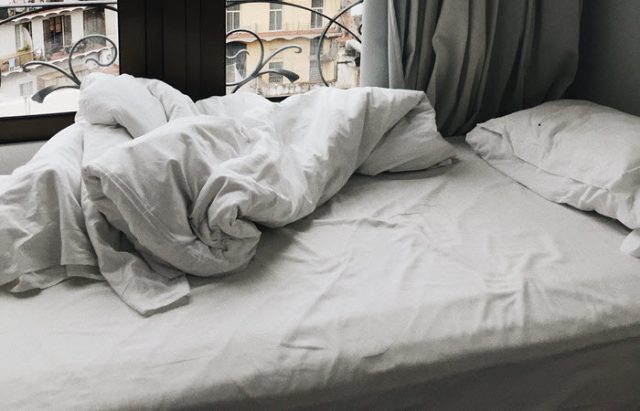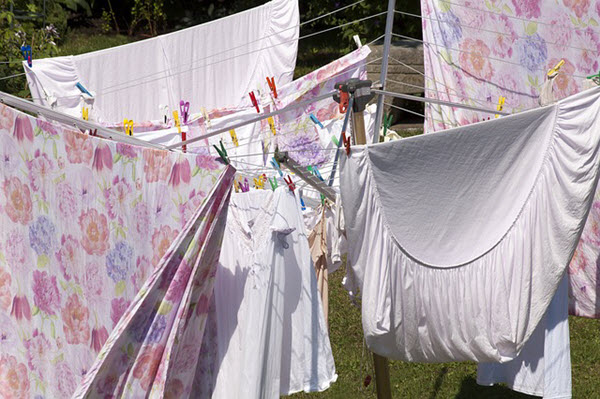5 Really Interesting Facts You Might Not Know About the Bed You Sleep In
By Mark Wiggins
June 6, 2019 • Fact checked by Dumb Little Man

You spend more of your life sleeping than you do any other single activity. Based on eight hours of sleep a night for 75 years, that’s 25 years of sleep or 9,125 days. That’s a lot of time spent in the same spot. If you are not changing your bed sheets as often as needed, you're putting yourself at risk of different health problems.
Read on to find out more.
Many of Us Take a Month to Wash Our Sheets

How often should you change your bed sheets?
There’s no definitive answer, and judging on a recent survey, there’s no consensus among the public either. While 28% of us take to washing our bed sheets once a week, 24% are willing to leave it for three weeks.
To many of us, that doesn’t seem to be an issue. 51% of people believe sheets remain hygienic for two to three weeks. 22% said they thought they remain fresh for as long as four or five weeks.
Take a swab and a scientific lab to the average bed sheet and you'll quickly discover how important bed hygiene can be to your health and well-being.
Not Changing Your Bed Sheets Opens Yourself up to a List of Nasty Bacteria
A recent study in association with the University of Seville’s Department of Biology investigated the conditions of bed sheets over the course of a month. The results found a whole host of dangerous bacteria linked to nasty diseases.
Among them were members of the actinomyces, clostridiales, bacteroidales, fusobacteriales, and neisseriales families of bacteria. Take just one family from this list, bacteroidales, and you find a number of associated diseases.
Appendicitis, cellulitis, and pneumonia are all infections that contain a significant amount of bacteroidales. Fusobacterium has been shown to directly cause some diseases such as skin ulcers and Lemierre’s syndrome.
Ultimately, the longer you leave your sheets unwashed, the greater the chance of catching something unpleasant.
A Chimpanzee Would Probably Turn It Down
Your bed sheets are a sponge for your skin as well as deposits from the oral cavity and from your stool. Leave it to build up for a month, and recent research suggests that the diversity of bacteria is greater than that of a chimpanzee’s nest.
In general, homes have been found to be unclean places. The profile of bacteria on your toilet seat is remarkably similar to other places around the home. Our way of life, spending large amounts of time in the same place, allows bacteria to spread easily.
These studies highlight the importance of keeping your bed sheets in clean working order. A good bill of health is the foundation of staying productive and motivated in general life. Sometimes, improving this can be as easy as changing your bed sheets.
Some of Us Have Similar Habits with Our Pajamas

It’s not just the bed sheets we sleep on that are a hotbed of bacteria. We don’t maintain the same hygienic standards for our pajamas than we do all our other items of clothing. It can lead to a similarly unpleasant build-up of bacteria.
Survey data highlights how lax we are when it comes to washing our nightwear. Men were found to wait an average of 13 nights before throwing their pajamas in the wash. At an average of 17 nights, women were found to wait even longer. For some of us, the smell test seems to suffice. 41% of women and 50% of men said that if their pajamas didn’t smell, then they’d be happy to keep them on.
Again, science warns us that dangerous bacteria lurk in unwashed nightwear. Many of us shower first thing in the morning, leaving a whole day’s worth of sweat and skin to transfer onto your clothes. The longer you leave bacteria on your clothing, the more chance there is that it will play a role in flaring up a nasty infection.
It Could Be the Cause of Your Bad Sleep
So, how long should you leave it?
Most experts recommend changing your bed sheets and your pajamas every week. Given how established the link between our well-being and a good night’s sleep is, it’s wise to try and remain hygienic.
Aside from the infections, dried skin flakes and a build-up of sweat on your sheets can cause irritation of the skin. Itchy, irritable skin will keep you up long into the night, damaging the quality of your sleep. For all of us, sleep is a key factor in maintaining well-being and quality of life.
Becoming more creative, energetic, and positive in life starts with a good night’s sleep. After just a few days, your bed can contribute to a bad night’s sleep rather than a good one. Give your career and health a boost by cleaning your bed sheets and pajamas every week.
Mark Wiggins
Mark Wiggins is a writer based in Leeds, England. Having spent years working in people management, he now specialises in writing about a whole manner of subjects relating to the modern workplace and staff motivation.


